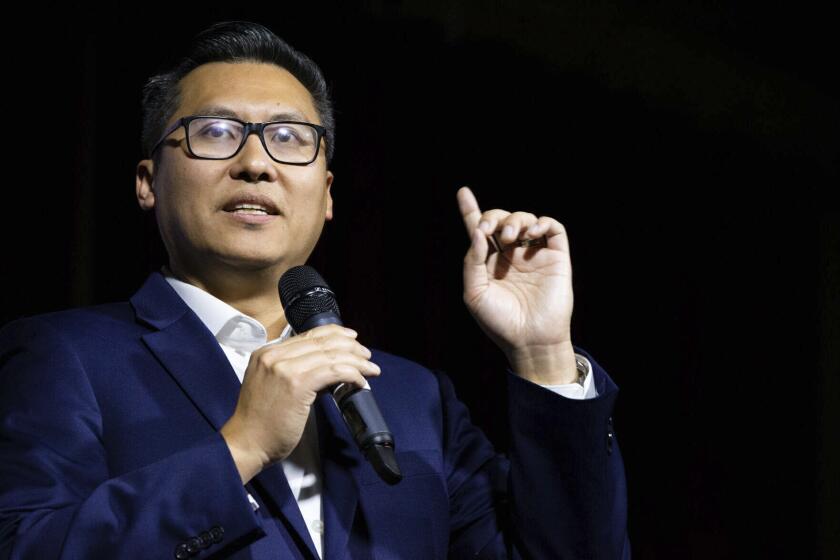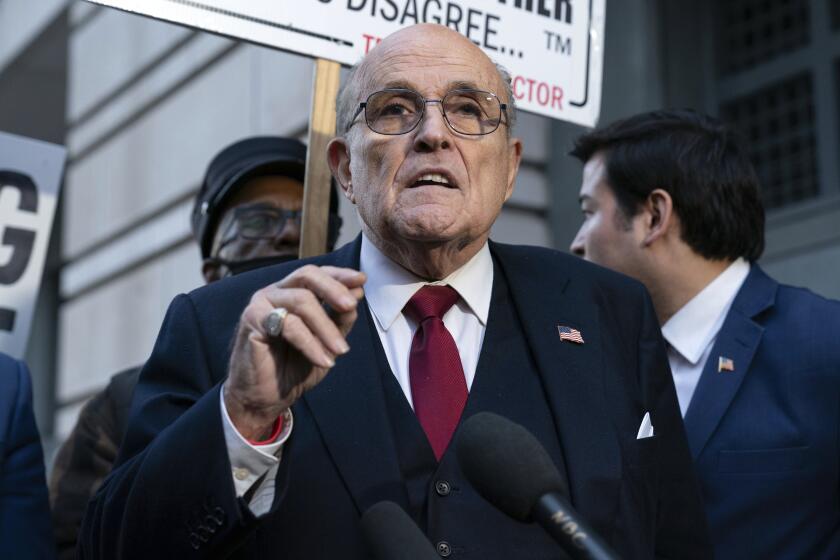Wilson Vetoes Workers’ Comp Reform Plan
Dismissing them as “fig leaf reforms” inadequate to the task, Gov. Pete Wilson on Wednesday vetoed key pieces of a Democratic program to overhaul the state’s expensive workers’ compensation system and promised to produce a bolder plan of his own.
The Republican chief executive denounced the Democratic approach as “not nearly adequate” to provide the substantial savings he said employers need to keep jobs in California, and he urged the Legislature to approve his reforms at a special session beginning Oct. 8.
Democrats quickly denounced Wilson’s rejection as a partisan ploy aimed at placing them in a bad light during election campaigns. Assemblyman Steve Peace (D-Chula Vista) said that for political reasons the last thing Wilson wants is reform.
“Do you really think he is going to subvert his own agenda for capturing the Legislature?” Peace said. “No matter how far we go, he will say it is not enough. He will move and dance and shuttle around. . . . It’s a great political strategy.”
Democrats say that by calling a special session of the Legislature less than a month before the Nov. 3 elections, Wilson seeks only to use the workers’ compensation issue as a lever to try to wrest control of the Assembly from Democrats.
Democrats say their legislation matches reforms proposed by Wilson in several major areas. The Democratic plan, approved on a party-line vote last month, envisioned savings of $1.15 billion a year, and the GOP bill embraced by Wilson offered annual cost reductions of $1.2 billion. The two versions are similar in their policing of fraud and in limiting some medical and legal costs incurred when workers’ compensation claims are filed.
However, Wilson was emphatic that more was needed now.
“Fig leaf reforms and cosmetic changes aren’t good enough,” Wilson said at a news conference where he vetoed three of the four Democratic bills. “We must truly reform the corrupt, inefficient workers’ compensation system that is killing our jobs.”
Wilson said the workers’ compensation overhaul he will send to a pre-election special session of the Legislature Oct. 8 must be enacted swiftly. He said his plan would be much the same as a GOP plan he supported that was killed last month.
He said his plan would require that workers filing stress injury claims demonstrate that a “sudden and extraordinary” event is the predominant cause of the injury, a tougher standard than the Democratic plan. The vetoed bills would have required that a worker prove that a stress-related injury was at least 51% caused by workplace events, rather than the 10% under current law.
Additionally, Wilson demanded that evaluations by forensic physicians be strictly limited. He said the Democratic restrictions contained loopholes. The governor also said he wants repeal of a law allowing insurance carriers to charge a rate that provides a built-in profit, but only if his other cost-saving reforms are enacted.
Asked if his program would be open to negotiation with Democrats who control both houses, the governor snapped: “Not very much.”
The vetoes drew other predictable responses. The California Chamber of Commerce deplored the bills as piling up costs that would exceed “reputed savings” to employers. An organization of attorneys for injured workers called the Wilson vetoes purely political.
The current $12-billion system of compensating workers for injuries suffered on the job is financed by employers who pay higher insurance than in most states. Worker benefits, meanwhile, are among the lowest-paid in any state.
There is wide agreement that the increasingly expensive system is squeezed by a siphoning of funds to middlemen--lawyers for workers, employer defense attorneys, forensic physicians, vocational rehabilitation specialists and others.
At the news conference Wednesday, the governor conceded that the motives for his veto and calling the special session were in part political.
“This election year does offer a rare opportunity (for employers) to grab the attention of their legislators who can, if they choose to act responsibly, be heroes,” Wilson said.
A Wilson political ally, William Campbell, president of the California Manufacturers Assn., said that the Democratic proposals “gave the appearance of reform, but in fact were nothing but an increase in benefits without any significant result in savings.”
However, J. Andrew McKenna, president of the California Applicants’ Assn., whose members represent injured workers and are major contributors to Democrats, accused Wilson of “using working men and women as political pawns to raise campaign contributions for anti-worker Republican candidates.”
Senate leader David A. Roberti of Van Nuys and Assembly Speaker Willie Brown of San Francisco, both Democrats, have announced plans for a brief two-day session to start Oct. 8, for considering workers’ compensation as well as possible overrides of gubernatorial vetoes of other bills.
However, they have said they do not expect approval of any reform package until after the Nov. 3 election. In a letter on Wednesday, Roberti urged Wilson to appoint someone to personally negotiate for him because “you have not thus far been represented before the Legislature on the workers’ compensation issue this year.”
The governor vetoed bills by Sens. Bill Lockyer (D-Hayward) and Patrick Johnston (D-Stockton) and Assemblyman Burt Margolin (D-Los Angeles). He has taken no action yet on a fourth bill, by Peace, that cracks down on fraudulent advertising in the workers’ compensation system and is similar to one supported by Wilson.
In all three veto messages, Wilson said that the package would have preserved current “gross inefficencies,” exacerbated the financial burden on small employers and increased costs to all employers.
One Democratic plan proposed, among other things, to increase the maximum temporary disability benefit from $336 to $448 a week starting next July. The GOP bill favored by Wilson would increase benefits incrementally, starting in 1994, to a maximum of $516 in 1997.
But Wilson said the Democratic bill would have cost employers an extra $800 million a year in increased benefit levels and increased utilization by workers.
He said that better benefits are “very much a part of the need for reform” but that the bill did not guarantee savings to employers that would offset the higher benefits. “This package by itself is premature and unfair to employers,” the governor said.
Another bill, Wilson said, contained “potentially meritorious” provisions for employer savings. But he said the legislation also contained so many exceptions that “most of the cost savings predicted by the authors would likely not be realized.”
More to Read
Get the L.A. Times Politics newsletter
Deeply reported insights into legislation, politics and policy from Sacramento, Washington and beyond. In your inbox three times per week.
You may occasionally receive promotional content from the Los Angeles Times.






